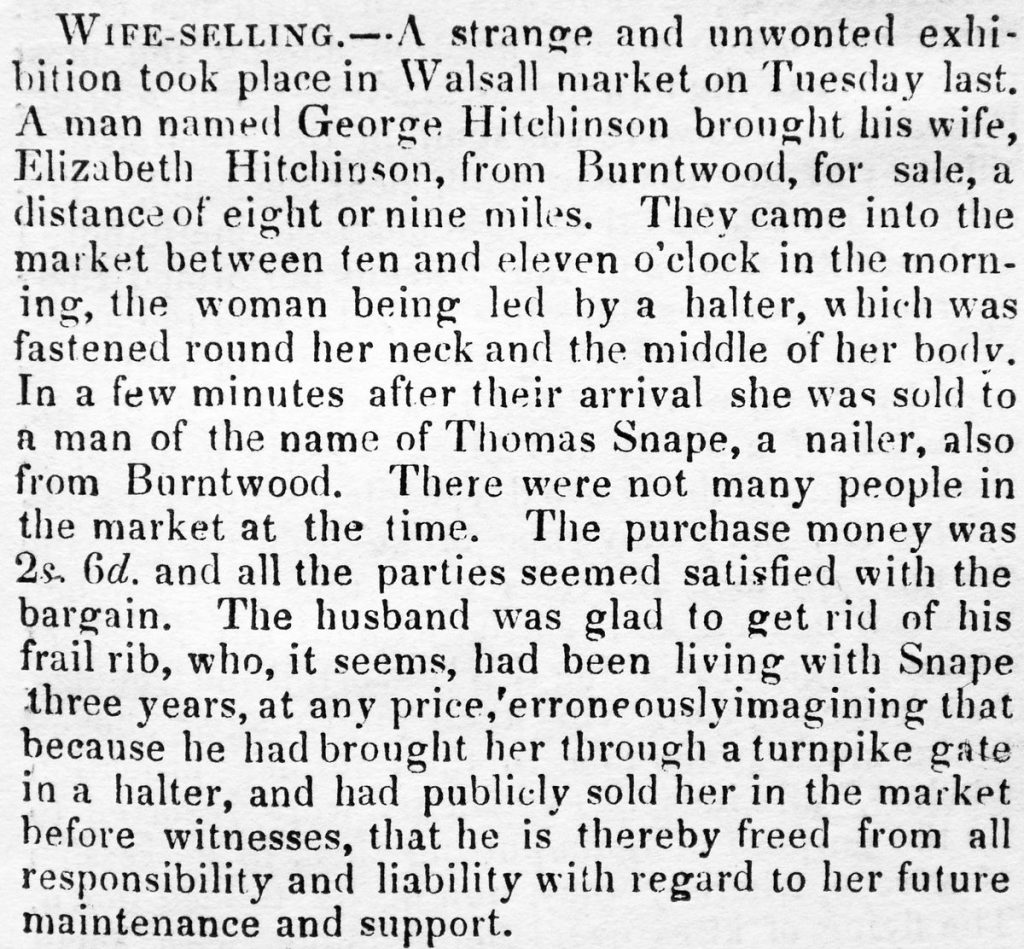
A strange and unwonted exhibition took place in Walsall market on Tuesday last,” the Wolverhampton Chronicle said about a case of wife-selling.
“A man named George Hitchinson brought his wife, Elizabeth Hitchinson, from Burntwood, for sale, a distance of eight or nine miles. They came into the market between ten and eleven o’clock in the morning, the woman being led by a halter, which was fastened round her neck and the middle of her body. “
“In a few minutes after their arrival she was sold to a man of the name of Thomas Snape, a nailer, also from Burntwood. There were not many people in the market at the time. “
“The purchase money was 2s 6d [about 13p today] and all the parties seemed satisfied with the bargain. The husband was glad to get rid of his frail rib, who, it seems, had been living with Snape three years, at any price, erroneously imagining that because he had brought her through a turnpike gate in a halter, and had publicly sold her in the market before witnesses, that he is thereby freed from all responsibility and liability with regard to her future maintenance and support.”
Wife-selling and the Mayor of Casterbridge
Readers will note the similarity of this to the plot of the Mayor of Casterbridge by Thomas Hardy, published in 1886. Michael Henchard, gets drunk on spiked Furmity. This is also known as frumenty – a mixture of Corn, milk, raisins and currents. The Furmity Woman at Weydon-Priors Fair adds Rum. Henchard, in a drunken rage, offers his wife for safe. She is purchased by Richard Newson, a sailor who goes on to have a successful relationship with Henchard’s wife until the sailor is drowned.
A cruel humiliation or a practical solution?
While not exactly legal, records show that wife-selling at markets happened occasionally from the 17th Century onwards. As in the case at Walsall Market, it seems to have been a recognised mechanism to end an unsuccessful marriage. In both factual and fictional cases, the wife accepts the sale to rid herself of a difficult husband. The husband is relieved of his lifelong duty to be financially responsible for his wife, and, for a fee, he passes that duty on to the buyer.
The sale seems to a modern onlooker to be a humiliation. But the public nature of it might be rather a public acknowledgement that the marriage has irrevocably broken down, and that another union has superseded the failed marriage. In the Walsall case, the new husband has, in fact, been living with the wife for some years.
At this time, there was no legal way to divorce except by the means of an expensive private Act of Parliament, far beyond the reach of any but the richest. Marriage itself was also a looser institution than we think. Hand-fasting and common-law marriages were very common in pre-Victorian times. The difficulty of divorce is also a theme in Hardy’s ‘The Woodlanders’.
A recipe for frumenty:
To make a rich frumenty for 10 people. Steep 1 lb of whole grain of wheat in water overnight, and then boil the steeped grains in one pint of milk until the whole be soft. Add thereto raisins and sultanas, honey a nutmeg freshly grated, a little cinnamon, brandy and cream: and serve it forty hot or cold.
Mistress Bartons Cookery book c1680. quoted in Charles Kightly’s Perpetual Almanac of Folklore
You might like to also see my post on the shaming skimmity ride, which also appears in the Mayor of Casterbridge.
On This Day
1415 St Crispin’s Day and the Battle of Agincourt.
This is part of the famous speech by Henry V, put in his mouth by William Shakespeare.
He that outlives this day, and comes safe home,
Will stand a tip-toe when this day is nam’d,
And rouse him at the name of Crispian.
He that shall live this day, and see old age,
Will yearly on the vigil feast his neighbours,
And say “To-morrow is Saint Crispian.”
Then will he strip his sleeve and show his scars,
And say “These wounds I had on Crispin’s day.”
Old men forget; yet all shall be forgot,
But he’ll remember, with advantages,
What feats he did that day. Then shall our names,
Familiar in his mouth as household words—
Harry the King, Bedford and Exeter,
Warwick and Talbot, Salisbury and Gloucester—
Be in their flowing cups freshly rememb’red.
This story shall the good man teach his son;
And Crispin Crispian shall ne’er go by,
From this day to the ending of the world,
But we in it shall be rememberèd—
We few, we happy few, we band of brothers;
For he to-day that sheds his blood with me
Shall be my brother; be he ne’er so vile,
This day shall gentle his condition;
And gentlemen in England now a-bed
Shall think themselves accurs’d they were not here,
And hold their manhoods cheap whiles any speaks
That fought with us upon Saint Crispin’s day.
First published in July 2022, revised and reposted October 2024 and 2025
